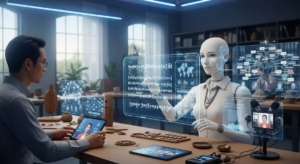AI and Language Evolution: How Technology is Shaping Modern Linguistics

In the blog post AI and Language Evolution: How Technology is Shaping Modern Linguistics, the author explores the profound impact of AI language evolution on contemporary communication. By examining key trends in Natural Language Processing (NLP), the article highlights the significance of dialect modeling and its contributions to understanding linguistic diversity. It further delves into technology’s role in language preservation, ensuring that valuable dialects and languages continue to thrive for future generations. The discussion underscores the importance of adapting to linguistic AI advancements, outlining strategies for embracing these changes. Overall, the post provides insights on how AI language evolution is transforming the way we communicate, offering vital takeaways for individuals and professionals in the field of linguistics.
Understanding The Impact Of AI Language Evolution On Modern Communication

The evolution of AI language evolution has significantly transformed how we communicate. From chatbots to virtual assistants, linguistic AI is reshaping our daily interactions by enabling machines to understand and respond to human language in increasingly sophisticated ways. This transformation not only enhances user experience but also introduces a new paradigm in linguistics, where human and machine communication becomes more seamless and intuitive.
Key Areas Affected By AI Language Evolution
- Natural Language Processing (NLP) advancements
- Cognitive computing in customer service
- Translation technology and its global implications
- Creation of personalized content
- Enhanced accessibility features for users
- Influence on social media interactions
As linguistic AI continues to develop, it not only streamlines communication but also poses unique challenges, such as the potential for misinterpretations and the need for ethical guidelines. AI’s ability to generate contextually relevant responses can sometimes lead to misunderstandings if the underlying algorithms do not accurately grasp cultural nuances. Addressing these challenges requires ongoing research and collaboration between linguists, technologists, and ethicists to ensure that AI language evolution serves its intended purpose while respecting the complexities of human language.
In conclusion, understanding the impact of AI-driven linguistic changes is essential for leveraging technology effectively in our modern communication landscape. By embracing these advancements, we can harness the power of AI language evolution to create a more informed, connected, and inclusive world where ideas and thoughts are shared more freely and effectively across various platforms and cultures.
Exploring Key NLP Trends And Their Role In Dialect Modeling

Recent advancements in artificial intelligence (AI) have significantly influenced AI language evolution, particularly in the realms of natural language processing (NLP) and dialect modeling. As technology continues to evolve, understanding these key NLP trends helps researchers and developers enhance the way machines comprehend and generate language. By focusing on dialect modeling, we can gain insights into regional variations and preserve linguistic diversity, which is crucial for effective communication in an increasingly globalized world.
Dialect modeling aims to create systems that understand and produce language with regional specifics, including accents, slang, and cultural references. As industries and applications increasingly rely on conversational AI, the importance of refining these models grows. From virtual assistants to automated customer services, the ability to address users in their preferred dialect fosters a more inclusive and effective interaction that resonates better with diverse audiences.
Steps To Implement NLP Trends
- Identify specific NLP trends relevant to your project goals.
- Gather diverse datasets that reflect the dialects being modeled.
- Choose appropriate machine learning frameworks and tools.
- Develop the dialect models using iterative training methods.
- Test the models for accuracy and cultural relevance.
- Integrate the models into existing applications.
- Solicit user feedback for continuous improvement.
These steps emphasize the importance of systematic implementation of NLP trends to ensure successful outcomes in dialect modeling. As the landscape of language technology grows ever more nuanced, companies must pay attention to evolving user needs and expectations, leveraging these NLP advances to create intuitive, user-friendly experiences.
Examples Of Dialect Modeling
Notable examples of dialect modeling in action include region-specific chatbots and virtual assistants that recognize and respond to various accents and local idioms. Companies like Google and Amazon have invested heavily in making these voice-activated systems more adaptable to user dialects. This creates opportunities for linguistic exploration and enhances user satisfaction, as individuals interact with familiar linguistic patterns. By developing robust dialect models, AI can provide nuanced responses and foster deeper connections across diverse populations.
Utilizing Language Preservation Tech For Future Generations

The intersection of technology and linguistics has fostered transformative innovations, particularly in the realm of language preservation tech. As languages face the risk of extinction, advancements in artificial intelligence have become pivotal in sustaining linguistic diversity. Through these technologies, endangered languages can be documented, analyzed, and revitalized, ensuring they remain a vital part of our global heritage for future generations. By harnessing various AI tools, researchers and communities alike are capable of developing resources that facilitate learning and preservation.
AI language evolution not only reshapes modern communication but also plays a crucial role in revitalizing languages that may otherwise fade into oblivion. The integration of AI empowers linguists to create detailed digital archives of underrepresented languages, fostering accessibility and linguistic research. Through automated transcription and translation features, language preservation tech offers an efficient way to document native speaker input and traditional narratives, combining modern efficiency with cultural heritage.
| Technology | Functionality | Impact on Preservation |
|---|---|---|
| Speech Recognition Software | Automates capturing spoken language | Enables documentation of native speakers |
| Machine Translation Tools | Translates between languages | Facilitates learning and cross-cultural exchange |
| Digital Archives | Stores linguistic data | Provides accessible resources for researchers |
| Mobile Apps | Engages younger audiences | Promotes language learning and use |
Benefits Of Language Preservation Tech
- Enhances understanding of linguistic diversity
- Facilitates cross-cultural communication
- Engages communities in preserving their heritage
- Provides educational tools for language learners
- Supports research in linguistics and anthropology
- Promotes the use of endangered languages in digital spaces
While the potential of language preservation tech is significant, it does not come without its challenges. Addressing issues such as accessibility, funding, and community involvement is essential for the successful implementation of these technologies. It is crucial for stakeholders to collaborate with indigenous communities to ensure that the technologies align with cultural values and meet the unique needs of diverse language speakers. By overcoming these hurdles, we can maximize the impact of AI language evolution in preserving our rich linguistic tapestry.
Challenges In Language Preservation
Despite the promising advancements offered by language preservation tech, several key challenges persist. First and foremost, the lack of sufficient funding can hinder projects aimed at documenting and revitalizing endangered languages. Additionally, the digital divide poses a significant barrier, as some communities may not have access to the necessary technology or internet connectivity. Moreover, it is vital to prioritize ethical considerations, ensuring that the communities involved have control over how their language and culture are represented and utilized in digital formats. Addressing these challenges is critical in moving forward towards an inclusive and sustainable approach to language preservation.
Key Takeaways: Embracing The Future Of Linguistic AI

The landscape of linguistics is undergoing a profound transformation fueled by AI language evolution. As we embrace these advancements, it is crucial to understand how linguistic AI is shaping communication practices and influencing the nuances of language. This technology is not merely a tool but a driving force that reshapes how we produce and interpret language across various contexts.
Actionable Steps For Embracing Linguistic AI
- Stay informed about the latest AI language evolution developments in linguistic applications.
- Experiment with various linguistic AI tools to enhance your communication efficiency.
- Engage in communities focused on AI and linguistics to exchange knowledge and experiences.
- Incorporate linguistic AI solutions into your business strategies for better customer interactions.
- Advocate for ethical standards in AI language applications to safeguard cultural and linguistic diversity.
- Support research initiatives that explore the intersection of AI and linguistics.
As professionals and enthusiasts delve deeper into the AI language evolution journey, it is essential to recognize the implications of these technologies on cultural dynamics and identity. With these advancements, we witness unprecedented opportunities for language preservation and innovation, fostering a greater understanding of minority languages and dialects. By actively participating in this evolution, individuals can help shape a future where technology complements human linguistic capabilities.
Briefing Document: The Transformative Impact of AI on Language and Communication
I. Summary
It highlights the profound and multifaceted impact of Artificial Intelligence (AI) on language, communication, and linguistics. The core message is that AI is not merely a tool but a “driving force” reshaping how we interact, understand, and preserve language. Key areas of impact include advancements in Natural Language Processing (NLP), the rise of dialect modeling, and the critical role of technology in language preservation. While offering significant opportunities for a more connected and inclusive world, AI also presents challenges related to misinterpretations, ethical considerations, funding, and accessibility. Embracing these advancements responsibly is crucial for leveraging AI effectively in our modern communication landscape.
II. Main Themes and Key Ideas
A. AI as a Transformative Force in Modern Communication
The source emphasizes that “AI language evolution has significantly transformed how we communicate.” AI, through applications like chatbots and virtual assistants, is “reshaping our daily interactions by enabling machines to understand and respond to human language in increasingly sophisticated ways.” This creates a “new paradigm in linguistics, where human and machine communication becomes more seamless and intuitive.”
- Key Areas Affected:
- Natural Language Processing (NLP) advancements
- Cognitive computing in customer service
- Translation technology and its global implications
- Creation of personalized content
- Enhanced accessibility features for users
- Influence on social media interactions
- Challenges: Despite the benefits, “linguistic AI… poses unique challenges, such as the potential for misinterpretations and the need for ethical guidelines.” This stems from AI’s difficulty in accurately grasping “cultural nuances,” necessitating “ongoing research and collaboration between linguists, technologists, and ethicists.”
B. Natural Language Processing (NLP) and Dialect Modeling
NLP advancements are central to AI’s influence on language. A significant trend within NLP is dialect modeling, which aims to “create systems that understand and produce language with regional specifics, including accents, slang, and cultural references.” This is crucial for “effective communication in an increasingly globalized world.”
- Importance of Dialect Modeling: Refining these models is growing in importance for industries relying on conversational AI, such as virtual assistants and automated customer services. The ability to “address users in their preferred dialect fosters a more inclusive and effective interaction that resonates better with diverse audiences.”
- Examples: Companies like Google and Amazon are investing heavily in “making these voice-activated systems more adaptable to user dialects,” which “creates opportunities for linguistic exploration and enhances user satisfaction.”
C. Language Preservation through Technology
AI plays a “crucial role in revitalizing languages that may otherwise fade into oblivion.” The integration of “language preservation tech” is pivotal in “sustaining linguistic diversity.” This technology allows for the documentation, analysis, and revitalization of endangered languages, ensuring they “remain a vital part of our global heritage for future generations.”
- Technological Functions and Impact:
- Speech Recognition Software: Automates capturing spoken language, enabling documentation of native speakers.
- Machine Translation Tools: Facilitates learning and cross-cultural exchange.
- Digital Archives: Stores linguistic data, providing accessible resources for researchers.
- Mobile Apps: Engages younger audiences, promoting language learning and use.
- Benefits of Language Preservation Tech:
- Enhances understanding of linguistic diversity
- Facilitates cross-cultural communication
- Engages communities in preserving their heritage
- Provides educational tools for language learners
- Supports research in linguistics and anthropology
- Promotes the use of endangered languages in digital spaces
- Challenges in Preservation: Significant hurdles include “lack of sufficient funding,” the “digital divide” limiting access to technology and internet, and the critical need for “ethical considerations,” ensuring communities “have control over how their language and culture are represented and utilized in digital formats.”
D. Embracing the Future of Linguistic AI
The source advocates for active engagement with the “profound transformation fueled by AI language evolution.” It is essential to “understand how linguistic AI is shaping communication practices and influencing the nuances of language.”
- Actionable Steps for Embracing Linguistic AI:
- Stay informed about the latest developments.
- Experiment with linguistic AI tools.
- Engage in AI and linguistics communities.
- Incorporate linguistic AI into business strategies for better customer interactions.
- Advocate for ethical standards in AI language applications to safeguard cultural and linguistic diversity.
- Support research initiatives at the intersection of AI and linguistics.
- Overall Vision: By actively participating in this evolution, individuals can “help shape a future where technology complements human linguistic capabilities,” fostering “unprecedented opportunities for language preservation and innovation.”
AI’s “language evolution” is fundamentally redefining communication, offering transformative potential to enhance user experiences, promote linguistic diversity through dialect modeling, and safeguard endangered languages. However, realizing these benefits requires a conscious effort to address the inherent challenges, including ensuring cultural accuracy, establishing ethical guidelines, and overcoming accessibility barriers. A collaborative and informed approach, involving linguists, technologists, and communities, is crucial to harness AI’s power to create a “more informed, connected, and inclusive world.
For similar articles, please visit: AI in Science & Technology
Homepage / humanaifuture.com
🎧 Listen to the Podcast
Want to explore this topic in more depth? Listen to the full podcast for more insights and expert commentary.
▶️ Play on Google DriveNo sign-up needed — just click and listen.
What is Natural Language Processing (NLP), and how does it relate to dialect modeling?
Natural Language Processing (NLP) is a key area of artificial intelligence that focuses on enabling computers to understand, interpret, and generate human language. It is crucial for "AI language evolution." In the context of dialect modeling, NLP advancements allow researchers and developers to create systems that comprehend and produce language with regional specifics, including accents, slang, and cultural references. This is vital for preserving linguistic diversity and ensuring effective communication in a globalized world, as it allows conversational AI to interact with users in their preferred dialects, fostering more inclusive and effective interactions.
What are some examples of dialect modeling in action?
Dialect modeling is actively used in region-specific chatbots and virtual assistants that can recognize and respond to various accents and local idioms. Major companies like Google and Amazon have invested significantly in making their voice-activated systems adaptable to user dialects. This not only enhances user satisfaction by providing familiar linguistic patterns but also creates opportunities for linguistic exploration and fosters deeper connections across diverse populations by offering nuanced responses.
How does "language preservation tech" utilize AI?
"Language preservation tech" leverages AI to sustain linguistic diversity, particularly for endangered languages. AI tools are pivotal in documenting, analyzing, and revitalizing these languages. This includes using speech recognition software to automate the capture of spoken language, machine translation tools to facilitate learning and cross-cultural exchange, digital archives to store linguistic data, and mobile apps to engage younger audiences and promote language learning. These technologies empower linguists and communities to create detailed digital archives, automate transcription and translation, and ultimately ensure that valuable languages remain a vital part of global heritage for future generations.
What are the benefits of using technology for language preservation?
The benefits of language preservation technology are multifaceted. It enhances the understanding of linguistic diversity, facilitates cross-cultural communication, and actively engages communities in preserving their heritage. Furthermore, it provides educational tools for language learners, supports research in linguistics and anthropology, and promotes the use of endangered languages in digital spaces. These technologies offer an efficient way to document native speaker input and traditional narratives, blending modern efficiency with cultural heritage.
What challenges exist in implementing language preservation tech?
Despite its promising advancements, "language preservation tech" faces several key challenges. A significant hurdle is the lack of sufficient funding for projects aimed at documenting and revitalizing endangered languages. The digital divide also poses a barrier, as some communities may lack access to necessary technology or internet connectivity. Moreover, ethical considerations are crucial, requiring collaboration with indigenous communities to ensure they have control over how their language and culture are represented and utilized in digital formats, and that the technologies align with their cultural values and unique needs.
What are the ethical considerations surrounding "AI language evolution"?
The evolution of "linguistic AI" presents unique ethical challenges. There is a potential for misinterpretations if underlying algorithms do not accurately grasp cultural nuances, which can lead to misunderstandings. It is crucial for ongoing research and collaboration between linguists, technologists, and ethicists to develop guidelines that ensure AI serves its intended purpose while respecting the complexities of human language. Additionally, in the context of language preservation, ethical considerations involve ensuring that communities have control over their language and culture in digital formats and that technology aligns with their cultural values.
What are the recommended actionable steps for embracing "linguistic AI" and its evolution?
To embrace the future of "linguistic AI," it is crucial to stay informed about the latest "AI language evolution" developments in linguistic applications. Individuals and professionals should experiment with various linguistic AI tools to enhance communication efficiency and engage in communities focused on AI and linguistics for knowledge exchange. Incorporating linguistic AI solutions into business strategies can lead to better customer interactions. Furthermore, it is essential to advocate for ethical standards in AI language applications to safeguard cultural and linguistic diversity and to support research initiatives exploring the intersection of AI and linguistics. By actively participating in this evolution, individuals can help shape a future where technology complements human linguistic capabilities and fosters a greater understanding of minority languages and dialects.




